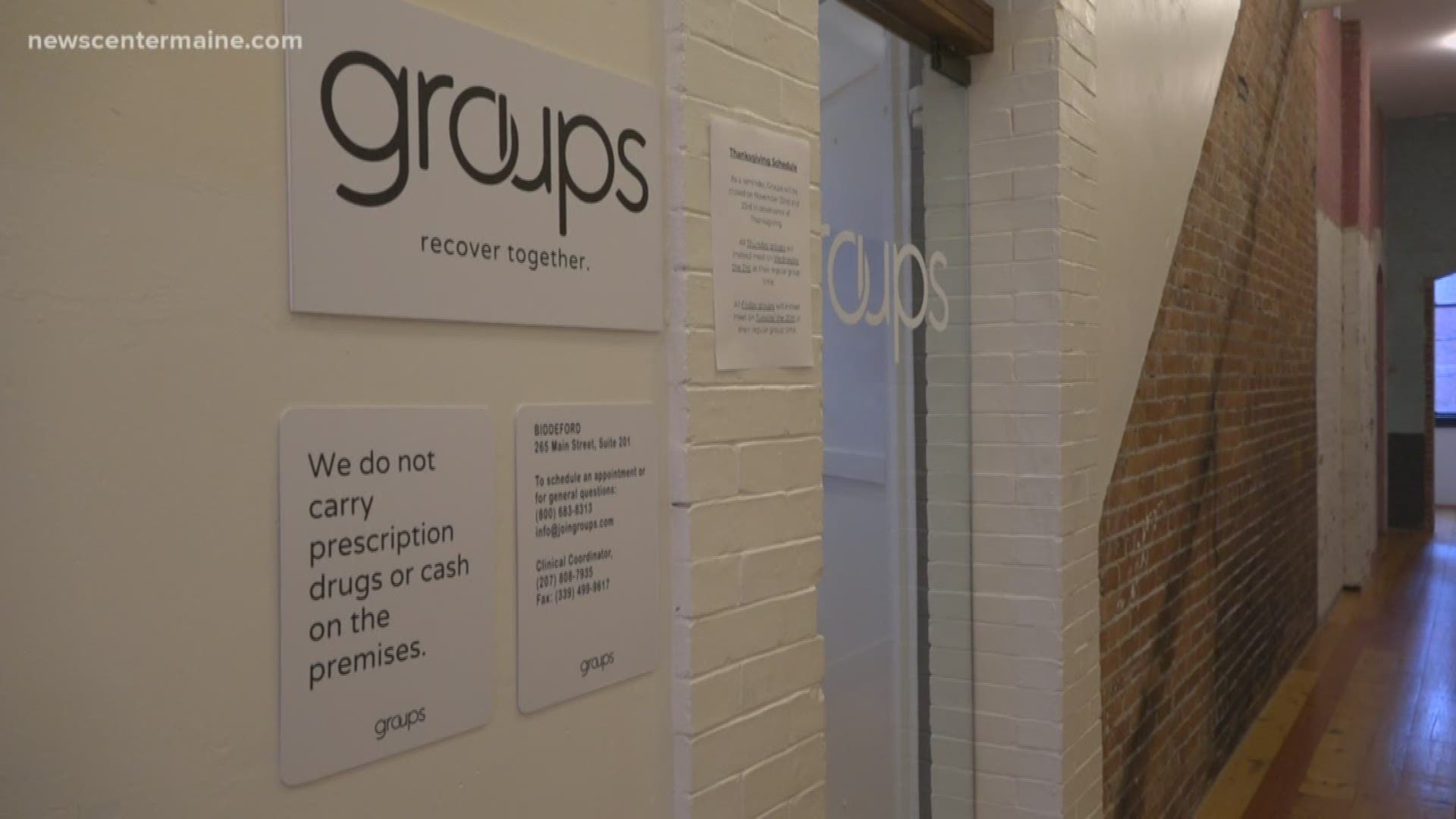STATEWIDE (NEWS CENTER Maine) -- In the last three years a new model of low-cost care for those looking to break free from opioid addiction has opened treatment clinics across the state. Groups is a new model that can serve hundreds of Mainers, with or without insurance. Some clinicians are raising concerns about this type of care.
"We currently have nine offices across the state of Maine in Biddeford, Portland, Augusta, Lewiston, Farmington, Rockland, Ellsworth, Calais and Machias," said Cooper Zelnick, Executive Director of Groups.
NEWS CENTER Maine took a tour inside the living-room like atmosphere of the Groups opioid treatment clinic in Biddeford, Tuesday.
Cooper Zelnick is the Executive Director of Groups which was founded five years ago in New Hampshire. It expanded to several states including Maine.
"We now see about 1,200 people per week in the state of Maine across our nine offices," he said.
At Groups, people seeking help are called "members." For $65 dollars a week, plus the cost of medication, members get one on one and group counseling services.
"Our counselors are all licensed or certified alcohol and drug counselors," described Zelnick. "Many of them also have mental health backgrounds. Aside from those counselors we do have a nurse on staff and we have about 30 physicians who work with us to provide medication assisted treatment."
"As an ex-addict and a person in recovery when I was ready to get help, I needed it that day," said Jamie Lebish, a certified alcohol and drug counselor (CADC). "And if I didn't get it, there was no guarantee I was going to even survive until the next day."
Jamie Lebish started working for Groups because he says it's a resource that's able to help people when they need it most. Like he did 20 years ago.
Healthy and hopeful to help others, he pursued a career in counseling. He says three months after he started working for groups his case load went from 65 members a week to 95.
"I was told by people in my company that you should be able to handle this because in other offices we do over 100. And it's not a problem," he said. "And I didn't understand that because how do you see clients each one and individually make sure they're safe and operating on the best they can possibly do. It's impossible."
He asked his supervisors and eventually corporate for help.
"I am buried, this is not safe," said Lebish. "And it wasn't working for me or the clients at that point."
His employment was terminated in July.
"I don't think it's a scam I don't think it's wrong. I think it's a great model and it's certainly helped thousands of people," said Lebish. "I think at some point or another though, you should come to a conclusion where 'yeah we've opened a lot of offices maybe we should huddle back a little bit, get a feel for what's going on, and how can we support our clinicians, so they can do the most effective care."
"We've learned a lot and we've made mistakes along the way," said Zelnick.
In an e-mail exchange after our interview, Zelnick clarified the 95 to 1 patient to counselor ratio.
He writes: "Our counselors see members in groups of up to 10 individuals. Each group meets for 1 hour per week, so a caseload of 95 would equate to 10 hours of direct service in a 40 hour work week for a counselor."
"The plan was never to figure out how to make money from insurance companies," he said in our interview Tuesday. "We just wanted to be a series of community organizations that delivered high quality care. And the beauty of that is that we figured out how to do it cheaply."
Zelnick says Groups was able to start accepting MaineCare in March. That's also when they added new roles, like a Peer Recovery Coach and Nurse Care Manager.
The low-cost model is able to serve hundreds of members, and interestingly, that's what Lebish says people should know about: That an individual member could be among 94 others that a counselor sees. So it might not be the right fit for everyone.
Also, Groups is about to expand its reach even further in Maine to places like Belfast, Waterville, and Houlton.

